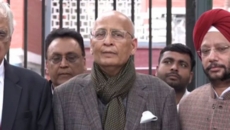New Delhi, Dec 20 (IANS) A 28-year-old man was arrested for duping over 900 families of the missing persons after downloading information from the ZIPNet (Zonal Integrated Police Network) and other such government websites, a Delhi Police official said on Wednesday.
The accused was identified as Shyamsunder Chauhan, a resident of Ranipur Mau, Uttar Pradesh and a Bachelor of Computer Applications (BCA) graduate from Indore.
The matter came to light after a complaint was received on December 15 from a person, a resident of Burari at Wazirabad police station regarding the disappearance of a girl.
"All the codal formalities were followed by collecting the details of the missing persons and uploading them to the missing person's portal of the Delhi Police. On the same day, the family of the victim received a call from a person who told the family that he knew the location of the missing girl and could tell them about her whereabouts," said the Deputy Commissioner of Police (north) Manoj Kumar Meena.
Then, the accused demanded money for telling the location and sent a QR code to receive payment. In this case, the accused person scammed the father of the victim girl of Rs 8,000.
During investigation, the police team observed that a similar case had been registered in Wazirabad police station and other parts of Delhi, indicating that the culprit had duped 904 people across the city using the same modus operandi.
The DCP said that unfortunately, the relatively low amounts often discourage families from reporting complaints against him.
The accused was traced and arrested by the police team. During interrogation, Chauhan disclosed that he downloaded information about the missing person from the ZIPNet and other such government websites.
Explaining the modus operandi of the accused, the DCP said that Chauhan used to contact the given number of victims' family members.
"The perpetrators pretended to be caretakers, falsely claiming to have the missing person in his custody. Deceptively, Chauhan along with his associates solicited funds from concerned family members, often using emotional manipulation and false promises to ensure the safety of the missing individual," said the DCP.
These deceptive actors employed online tactics, presenting QR codes for monetary transactions. Families, desperate for the well-being of their loved ones, succumbed to these schemes, sending amounts ranging from Rs 2,000 to 40,000.





